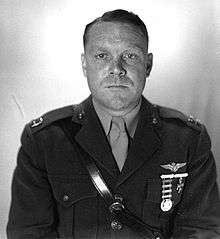Floyd B. Parks

Major Floyd Bruce Parks (January 16, 1911 – June 4, 1942) was a decorated aviation officer in the United States Marine Corps during World War II.
Biography
Parks was born in Salisbury, Missouri, the first child of James B. Parks and his wife Elizabeth Ann Bowman. James Parks was a widower with one son from his first marriage. Floyd Parks also had a younger brother, Billy Bowman Parks, born in 1921. Their father died on 3 February 1924, leaving their mother a widow.
Floyd Parks enlisted in the United States Navy in 1928 and served two years aboard destroyers. In 1930 he received an appointment to the United States Naval Academy. Parks earned the infamous Black "N" award, given for major infractions, on a number of occasions. He sang in the Midshipman Choir and was a member of Annapolis' water polo team, also participating in football and swimming. Parks graduated in the upper third of his class of 1934, and chose a commission in United States Marine Corps. He was appointed a Second Lieutenant on June 1 and assigned to the Philadelphia Navy Yard for a year, before serving on the cruiser USS Astoria (CA-34). In May 1936 he reported to the Naval Air Station Pensacola for flight training. While swimming in the Gulf of Mexico, Parks and an enlisted man, rescued a Marine private from drowning, winning commendation for his "quick action, good judgment and swimming ability".
Parks was designated a Naval Aviator on 12 June 1937, and in August reported to Naval Air Station San Diego, California. The following year he married Margaret Elizabeth Murray of El Paso, Texas. In June 1940 he was reassigned to the NAS Pensacola as a flight instructor. In May 1941, he transferred to the First Marine Aircraft Wing, Fleet Marine Force, Quantico, Virginia, and trained as a dive bomber pilot. He remained in that assignment until March 1942, when he joined the Second Marine Aircraft Wing in San Diego, for deployment to Midway. His wife, Margaret, returned to El Paso to stay with her mother during his deployment.
He was promoted to the rank of Major on 8 May 1942, and given command of Marine Fighting Squadron Two Twenty One (VMF-221) during the Battle of Midway. Parks' squadron was predominantly equipped with Brewster F2A-3 (Model B-439) fighter aircraft, supplemented by a handful of Grumman F4F-3 Wildcats, all handed down from U.S. Navy squadrons. More than half of the aviators assigned to Parks' unit were fresh from flight training in San Diego.
During the battle of Midway, Parks was killed in action on the first day of the battle on June 4, 1942, while leading his squadron against a superior force of Japanese fighters and bombers attacking the island. For his heroism, Major Parks was posthumously awarded the Navy Cross. The citation reads as follows:
"For extraordinary heroism and conspicuous devotion to duty as Squadron Commander for Marine Fighting Squadron TWO TWENTY-ONE, in action against enemy Japanese forces during the Battle of Midway, June 4, 1942. Leading his squadron in a dauntless and aggressive attack against a vastly superior number of Japanese bomber and fighter planes, Major Parks aided in disruption the plans of the enemy and lessening the effectiveness of their attack, thereby contributing materially to the success of our forces. As a result of his courageous and daring tactics and because of the circumstances attendant upon this engagement, there can be little doubt that Major Parks gallantly gave up his life in the service of his country. He displayed the characteristics of a fine leader and excellent airman in keeping with the highest traditions of the United States Naval Service."
Namesake
USS Floyd B. Parks (DD-884) was named for him; his widow was present at the commissioning ceremony.
References
- This article incorporates text from the public domain Dictionary of American Naval Fighting Ships.